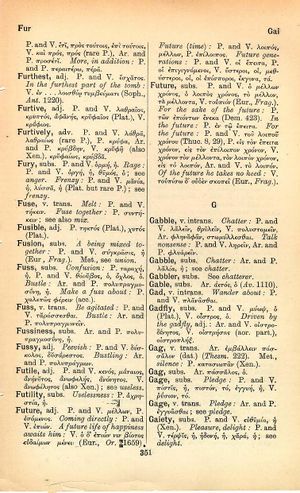futile: Difference between revisions
From LSJ
τὸ ἓν καὶ τὸ ὂν πολλαχῶς λέγεται → the term being and the term one are used in many ways, one and being have various meanings, one and being have many senses
(6_7) |
(D_4) |
||
| Line 5: | Line 5: | ||
{{Lewis | {{Lewis | ||
|lshtext=<b>fūtĭle</b>: etc., v. futtĭle, etc. | |lshtext=<b>fūtĭle</b>: etc., v. futtĭle, etc. | ||
}} | |||
{{Gaffiot | |||
|gf=(1) <b>fūtĭlĕ</b> <b>(futt-)</b>, adv., inutilement, vainement : Pl. St. 398.<br />(2) <b>fūtĭle</b> <b>(futt-)</b>, is, n., aiguière, vase à eau : Serv. En. 11, 339 ; Don. Phorm. 746. | |||
}} | }} | ||
Revision as of 06:54, 14 August 2017
English > Greek (Woodhouse)
adj.
P. and V. κενός, μάταιος, ἀνήνυτος, ἀνωφελής, ἀνόνητος, V. ἀνωφέλητος (also Xen.); see useless.
Latin > English (Lewis & Short)
fūtĭle: etc., v. futtĭle, etc.
Latin > French (Gaffiot 2016)
(1) fūtĭlĕ (futt-), adv., inutilement, vainement : Pl. St. 398.
(2) fūtĭle (futt-), is, n., aiguière, vase à eau : Serv. En. 11, 339 ; Don. Phorm. 746.

